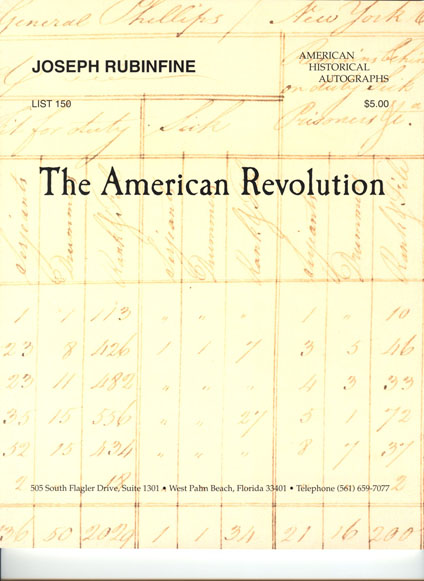Rare Book Monthly
Book Catalogue Reviews - September - 2004 Issue
American Revolution Manuscripts<br>From Joseph Rubinfine
By Michael Stillman
This month we are reviewing our first catalogue from Joseph Rubinfine, although it is his list number 150. Rubinfine specializes in American historical autographs and manuscripts. This particular list is a collection of manuscripts from the American Revolution, all coming from the period from 1775-1783. Most are from military figures, all the way from letters home from an enlisted soldier to messages from George Washington, while a few are from other political figures. Anyone whose collecting interests run to that earlier greatest generation will find the material in this catalogue right up their alley. Those who specialize in signers of the Declaration of Independence will also find many samples here.
There's no better place to begin then the start of the revolution. Item 12 is an original muster roll of minutemen from Wilmington, Massachusetts, who went to Concord on that first day. Wilmington received notice of the upcoming battle by an unknown colleague of Paul Revere, who passed through the town in the early morning hours, probably before dawn. They marched to Concord, and based on their "mileage" allowance, probably followed retreating British troops all the way to Boston. Priced at $90,000.
A year later, Cambridge Massachusetts Town Clerk Andrew Bordman signed a notice directing the town constable to notify residents of a special town meeting to discuss an additional bounty for those enlisting in a regiment bound for Canada, and to hear about losses incurred to the town because of the presence of British and Continental troops. What is particularly noteworthy about this document is its date: July 4, 1776. Item 50. $3,500.
Here is a document requesting a furlough for a sick soldier, dated September 2, 1776, and signed by Joseph Chapman, "sirgin." In it he states that "Stephen Gorham a solder...has bin sick & unfit for duty som time..." He has a "belly ake" and will be of no "servis" until he "gits" fit. Now you can undoubtedly be a good surgeon without being a good speller, but that's a few too many obvious mistakes from someone I would want operating on me. Item 88. $650.
Henry Lee, "Light Horse Harry," was a patriot and skilled horseman from Virginia, who would become a favorite of General George Washington. His accomplishments included raids on British supplies and a successful surprise attack in New Jersey. After the War, he would return to Virginia where he would hold several offices, including governor. In 1794, Washington would call on him to help quell the Whiskey Rebellion in Pennsylvania. When Washington died, Lee would give the famous eulogy containing the lines "first in war, first in peace, and first in the hearts of his countrymen." Later years would not prove so fortuitous for Lee. He would land in debtors prison after land speculation reduced his family to poverty, and would be injured defending a newspaper publisher friend who opposed the War of 1812.









